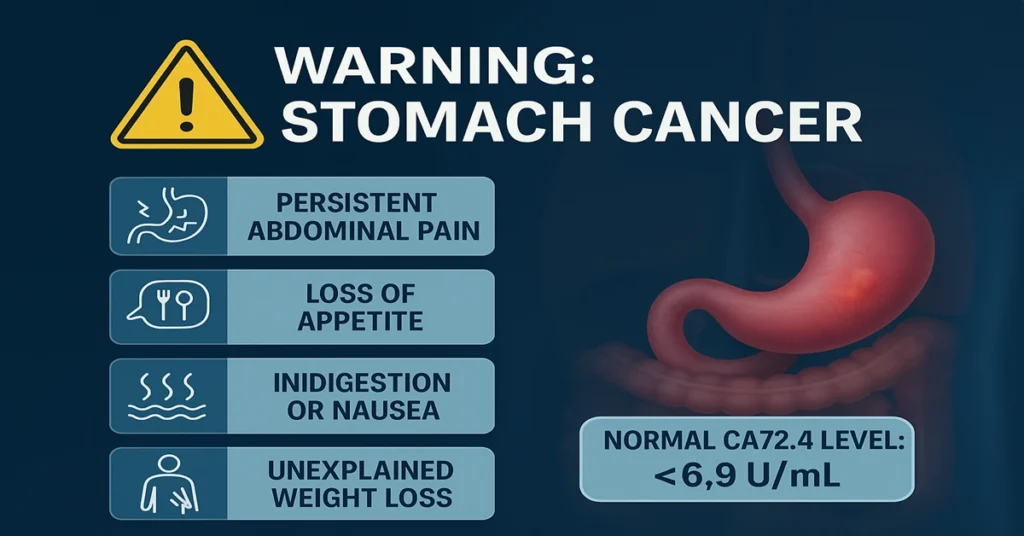Overview
CA72.4, also known as Cancer Antigen 72.4 or TAG-72 (Tumor-Associated Glycoprotein 72), is a tumor marker mainly linked to gastric (stomach) cancer. It can also be elevated in some other cancers such as ovarian (mucinous type) and colorectal (colon and rectum) cancers.
The CA72.4 blood test measures the amount of this antigen in the bloodstream. It is mostly used to:
- Detect and monitor stomach cancer
- Assess treatment effectiveness
- Detect recurrence or relapse after therapy
CA72.4 is not typically used for cancer screening because levels can also rise in a few non-cancerous (benign) conditions.
What is CA72.4?
CA72.4 is a glycoprotein antigen found on the surface of certain cancer cells. These malignant cells shed the antigen into the bloodstream, where it can be measured by laboratory testing.
The CA72.4 test is most useful in diagnosing and monitoring stomach cancer, though it may also be relevant in ovarian and colorectal cancers.
In medical laboratories, CA72.4 is often tested along with other markers like:
- CEA (Carcinoembryonic Antigen)
- CA19-9
This combination improves accuracy in identifying gastrointestinal malignancies.
Where is CA72.4 Produced in the Body?
CA72.4 is primarily produced by malignant tumor cells (not normal healthy cells). It is especially expressed in the following tissues:
- Stomach (gastric epithelial cancer cells)
- Ovarian cancer cells – especially in the mucinous subtype
- Colorectal cancer cells
- Pancreatic and lung cancers (less commonly)
In healthy people, CA72.4 levels are usually very low or undetectable.
Functions and Clinical Importance of CA72.4
CA72.4 does not serve a biological function in normal body processes but is a clinically important tumor marker for diagnosis and monitoring of cancer.
1. Gastric Cancer Marker
- The main use of CA72.4 is to detect and monitor stomach cancer.
- It helps assess disease progression and treatment success.
2. Ovarian Cancer (Mucinous Type)
- CA72.4 may be measured alongside CA125 in patients with mucinous ovarian tumors for improved diagnostic accuracy.
3. Treatment Response Indicator
- A decline in CA72.4 after therapy indicates effective treatment.
- A rise after completion of therapy may suggest recurrence or metastasis.
4. Combined Marker Use
- Doctors often use CA72.4 along with CEA and CA19.9 in evaluating gastrointestinal cancers, improving diagnostic confidence and monitoring accuracy.
Causes of Low or Normal CA72.4 Levels
Low CA72.4
- Common in healthy individuals.
- Indicates no active cancer or effective response to treatment.
- After successful surgery or chemotherapy, levels typically return to the normal range.
Symptoms of Low Levels
- There are no symptoms associated with low CA72.4.
- Low levels generally signify remission (control of the disease).
Causes of High CA72.4 Levels (Elevated CA72.4)
Cancer-Related Causes
- Gastric (stomach) cancer – most common and primary association
- Ovarian cancer (mucinous type)
- Colorectal cancer
- Pancreatic cancer
- Lung cancer (rarely)
Non-Cancerous (Benign) Causes
Even though CA72.4 is more specific to malignancies, it may also rise in certain benign conditions, such as:
- Liver cirrhosis
- Benign ovarian cysts
- Peptic ulcer disease
- Chronic gastritis (stomach inflammation)
In these cases, the elevation is usually mild and temporary.
Symptoms of High CA72.4 Levels
CA72.4 itself does not produce symptoms. However, underlying conditions such as stomach cancer or ovarian cancer can present with the following signs:
Gastric (Stomach) Cancer Symptoms
- Persistent abdominal pain or discomfort
- Indigestion or nausea
- Bloating or fullness after small meals (early satiety)
- Loss of appetite
- Unexplained weight loss
Ovarian or Colorectal Cancer Symptoms
- Pelvic pain or swelling
- Changes in bowel habits
- Fatigue or weakness
These symptoms, when persistent, should prompt further investigation.
Reference Range (Normal Blood Levels)
| Level Category | CA72.4 (U/mL) | Interpretation |
|---|---|---|
| Normal | < 6.9 U/mL | Normal or healthy |
| Mild Elevation | 7 – 20 U/mL | Could indicate benign or early disease |
| High Elevation | > 20 U/mL | Suggestive of advanced or recurrent cancer |
Note: Slight variations may occur between laboratories. Always correlate results with imaging and clinical findings.
Sample Type and Testing Details
- Sample Type: Blood (Serum)
- Tube Used: Red Top (Plain Tube)
- Fasting Required: Not required
- Result Time: 1–2 days
Regular testing may be recommended during or after cancer therapy to track changes over time.
Test Preparation
- No fasting or special preparation is needed.
- Inform your doctor if you are undergoing cancer therapy, have stomach or liver disorders, or recently had surgery.
- Avoid testing immediately after infections or inflammations, as they may slightly influence results.
When to Consult a Doctor
You should contact your doctor if you experience:
- Persistent abdominal pain or bloating
- Difficulty eating or feeling full quickly
- Unexplained weight loss
- Nausea or vomiting
- Pelvic or lower abdominal pain (in women)
If your CA72.4 level is consistently high or increasing, your doctor may recommend:
- Imaging tests (CT scan, ultrasound, endoscopy)
- Other tumor markers (CEA, CA19.9)
- Biopsy for confirmation
Important Word Explanations
- Tumor Marker: A substance made by cancer cells or by the body in response to cancer.
- Glycoprotein: A molecule made of protein and sugar, often present on cell surfaces.
- Malignant: Cancerous; can spread and damage nearby tissues.
- Benign: Non-cancerous; not life-threatening.
- Metastasis: The spread of cancer to other parts of the body.
- Recurrence: Return of cancer after treatment.
- TAG-72: Tumor-Associated Glycoprotein 72, the molecule measured as CA72.4.
~END~

